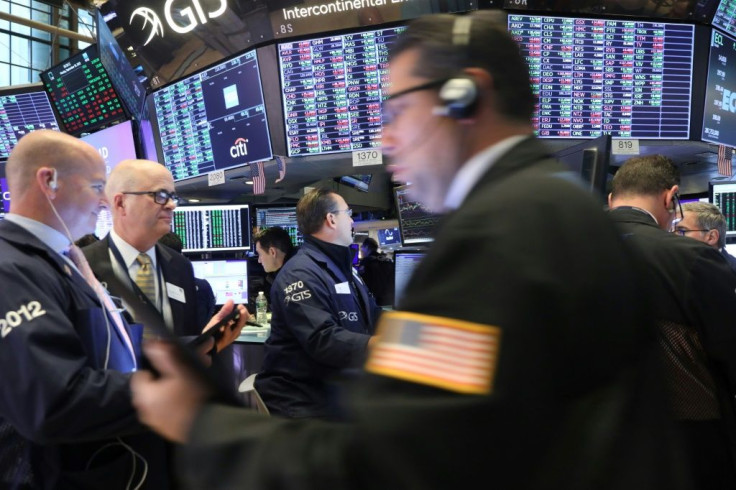Friday's Stock Market Open: US Equities Rise As Traders Weigh Federal Efforts To Combat Coronavirus

KEY POINTS
- Senate Republican coronavirus relief bill would provide $50 billion to the U.S. airline industry
- California Gov. Gavin Newson issued an order to “stay at home” for residents statewide
- German government seeks 500 billion euro rescue fund for companies hurt by coronavirus
Update: 2:35 p.m. EDT:
U.S. stocks have incurred deeper losses in late afternoon trading.
The Dow Jones Industrial Average dropped 474.42 points to 19,612.77, while the S&P 500 fell 53.97 points to 2,355.42 and the Nasdaq Composite Index dropped 97.47 points to 7,053.11.
Update: 12:10 p.m. EDT:
U.S. stocks have turned lower on erratic trading
The Dow Jones Industrial Average dropped 114.64 points to 19,972.55, while the S&P 500 fell 28.69 points to 2,380.70 and the Nasdaq Composite Index tumbled 19.76 points to 7,130.82.
In Europe markets closed higher as Britain’s FTSE-100 gained 1%, France’s CAC-40 jumped 5.39% and Germany’s DAX rose 4.33%.
Crude oil futures plunged 10.11% to $22.67 per barrel.
The Federal Reserve said it will expand its asset purchase program to include municipal bonds
“The markets are trading more on emotion than the actual data,” said Sal Bruno, chief investment officer at IndexIQ. “That’s what’s causing the volatility.”
Original story:
U.S. stocks rose Friday as investors appeared to be heartened by aggressive moves by the federal government and central banks to minimize economic impact of coronavirus epidemic.
The Dow Jones Industrial Average gained 133.65 points to 20,220.84. while the S&P 500 gained 19.72 points to 2429.11 and the Nasdaq Composite Index rose 99.47 points to 7,250.04.
Senate Republicans unveiled a proposed coronavirus relief bill that would provide $50 billion to the U.S. airline industry, $8 billion to cargo air carriers and $150 billion to other distressed industries. The bill would also cap executive pay for two years.
Late Thursday, California Gov. Gavin Newson issued an order to “stay at home” for residents statewide, to slow the spread of the virus.
“Home isolation is not my preferred choice ... but it is a necessary one ...This is not a permanent state, this is a moment in time,” Newsom said.
“Market volatility will persist until the government – fiscal or monetary – provides a backstop to stressed corporates and small & medium businesses,” said New York Life Investments’ economist and multi-asset portfolio strategist Lauren Goodwin. “Support of those functions is vital to ensuring the economic disruption of covid-19, though severe, is temporary.”
Spiegel reported that the German government seeks to establish a 500 billion euro ($537 billion) rescue fund for companies hurt by coronavirus.
“We are now starting to lean into risk,” Chad Morganlander, senior portfolio manager at Washington Crossing Advisors. “The tail of this is going to be potentially somewhat more extended than what the overall market thinks, so we’re not going to get back to business as usual for the next three months, but the policy backdrop across the globe will help soften the blow.”
Overnight in Asia, markets were mixed. China’s Shanghai Composite rose 1.61%, while Hong Kong’s Hang Seng surged 5.05%, and Japan’s Nikkei-225 dropped 1.04%.
In Europe markets were higher as Britain’s FTSE-100 gained 2.18%, France’s CAC-40 jumped 4.36% and Germany’s DAX rose 3.78%.
Crude oil futures fell 1.78% at $24.77 per barrel, Brent crude dropped 0.77% at $28.25. Gold futures gained 1.24%.
The euro edged up 0.07% at $1.07 while the pound sterling jumped 2.65% at $1.789.
© Copyright IBTimes 2024. All rights reserved.




















